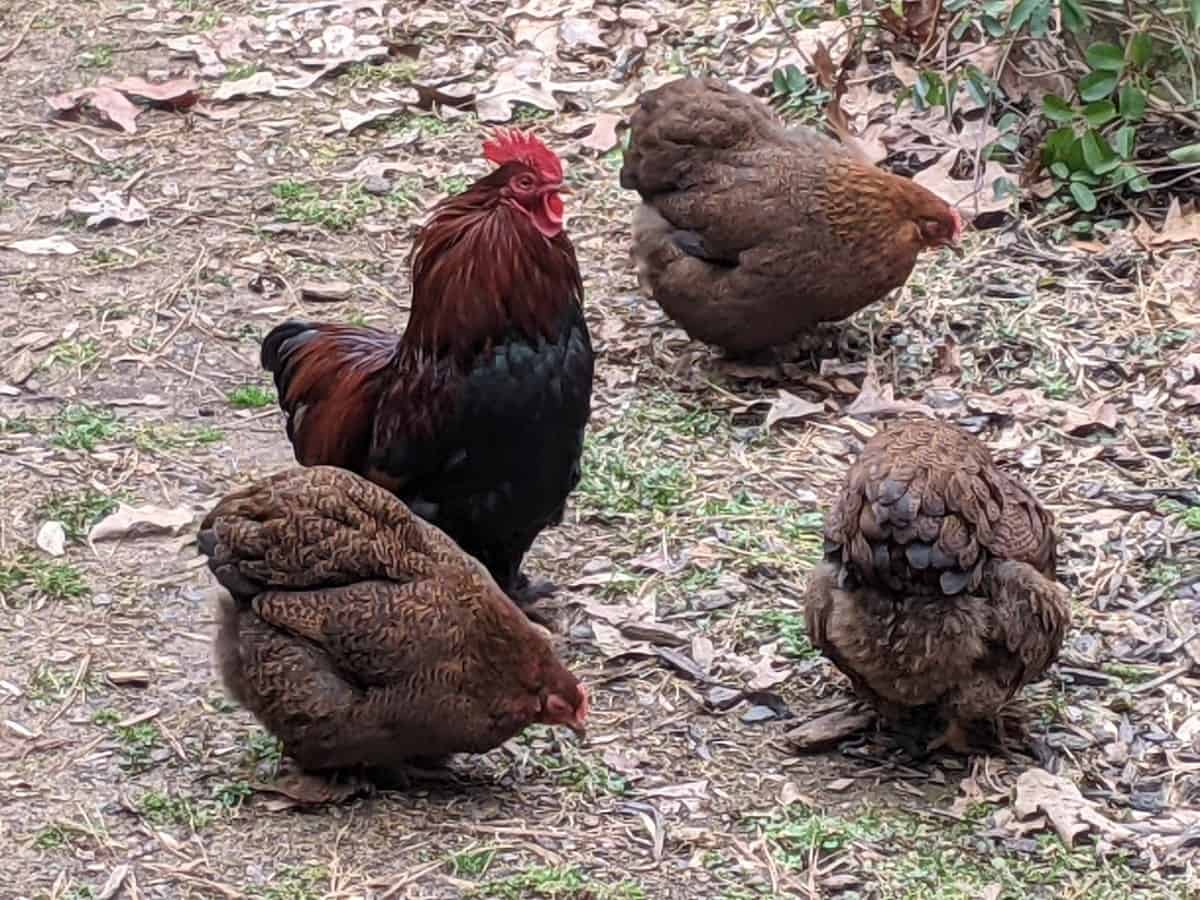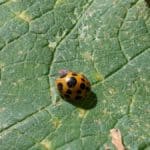Backyard chickens or free-range chickens are exposed to the elements more than chickens kept indoors. Eating various insects can expose chickens to parasites without you being aware, and before long, you can have an infestation. If you have chickens, you need to know how to control parasites effectively.
Parasites in chickens can be controlled by preventative actions like de-worming them regularly and treating external parasites with the recommended veterinary or natural remedies. You can treat individual chickens and isolate them, but it is recommended you treat the whole flock and the coop every two weeks in the case of external parasites like mites.
Early detection and treatment for parasites are critical and can potentially save your chicken’s life. Chickens are commonly plagued by a wide variety of internal and external parasites. Parasites can affect not only the quality of the eggs and meat of a chicken, but they can severely affect the health of your whole flock.
Let’s look at how to control parasites in chickens effectively.
How Do I Know That My Chicken Has Parasites?
If your chickens have parasites, there will be a list of symptoms you can look out for.
The following symptoms are typical for internal parasite infestation;
- A pale appearance around the face, wattles, and comb.
- Constant yawning or gaping, gasping.
- Rapid weight loss.
- Stretching the head and shaking it.
- Foamy poop.
- Worms and blood in the poop.
- Drop-in egg production and shell quality.
The following symptoms are typical for external parasite infestation;
- Constant scratching of the face and head.
- Blood on the wattles or tips of the comb.
- Refusal to roost in the coop.
- Loss of feathers or feathers that look disheveled.
- Drop-in egg production or quality.
External Parasites In Chickens
External parasites are more accessible to identify than internal. They are tiny creatures that live in between the feathers, skin, or feet scales of a chicken. Their presence indicates they have a harmonious living environment, and that needs to change.
The external parasites you can expect to find on your flock are;
- Mites
- Lice
- Fleas and
- Flies
Mites
Mites might remind you of a spider, and that’s because they are relatives. They are tiny, eight-legged creatures that live in the blood of chickens. There are three common types of mites;
- Scaly Leg Mite.
- Northern Fowl Mite.
- Red Mite.
How to spot signs of mites?
- Over preening the feathers.
- Anemia – color loss of the wattles and comb.
- Loss of feathers outside of molting season.
- Pecking at feathers.
- Unsightly leg scales.
Northern Fowl Mite
This mite is easy to identify and stays on the chickens day and night. They do not live very long, so they breed prolifically.
How To Control The Northern Fowl Mite?
- Dust the entire flock of chickens with a mite solution powder.
- Spray the coop and seven days later again.
- Supply the chickens with a wood ash bath.
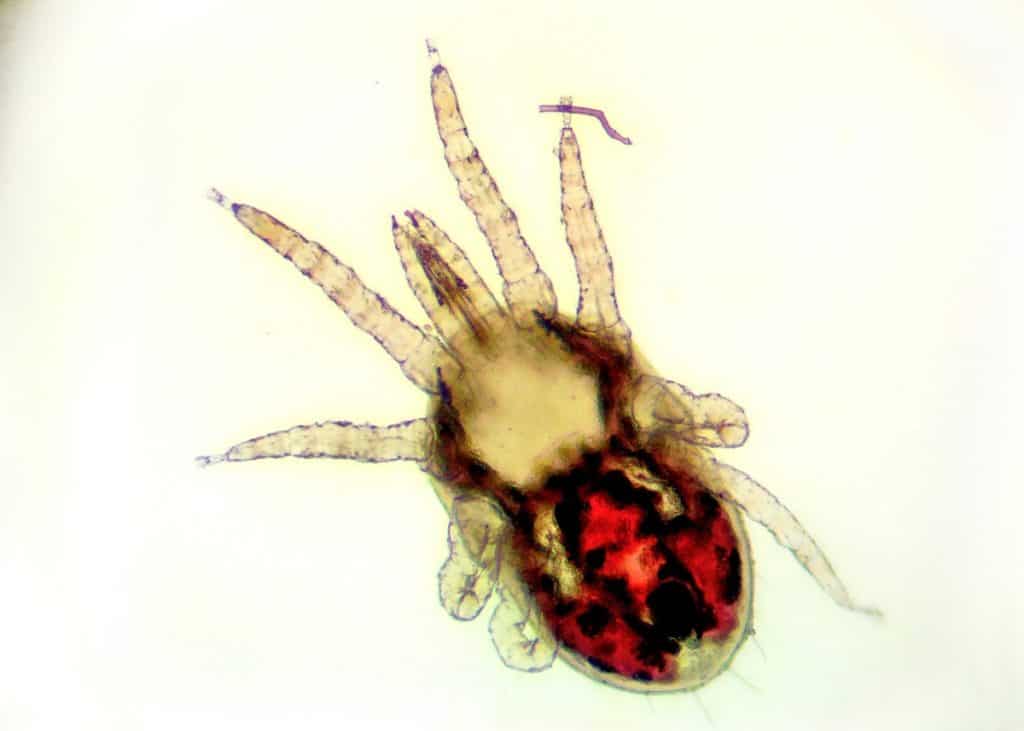
Red Mite
The red mite only feeds on the chickens at night. During the day, it lives in the coop between the nesting boxes and any small spaces it can hide during the day. The way to identify that it’s red mite is the chickens will refuse to roost at night.
How To Control Red Mites?
- Dust the chickens with a mite solution powder.
- Rehouse them temporarily for ten days.
- Clean out the entire coop, burn all the nesting materials, spray mite killer in every possible corner of the enclosure.
- Spray again ten days later to end the lifecycle.
Scaly Leg Mite
These mites are easy to identify. They burrow in under the leg scales of your chickens and feed on them from there. Not only are mites painful, but they can cause death if untreated.
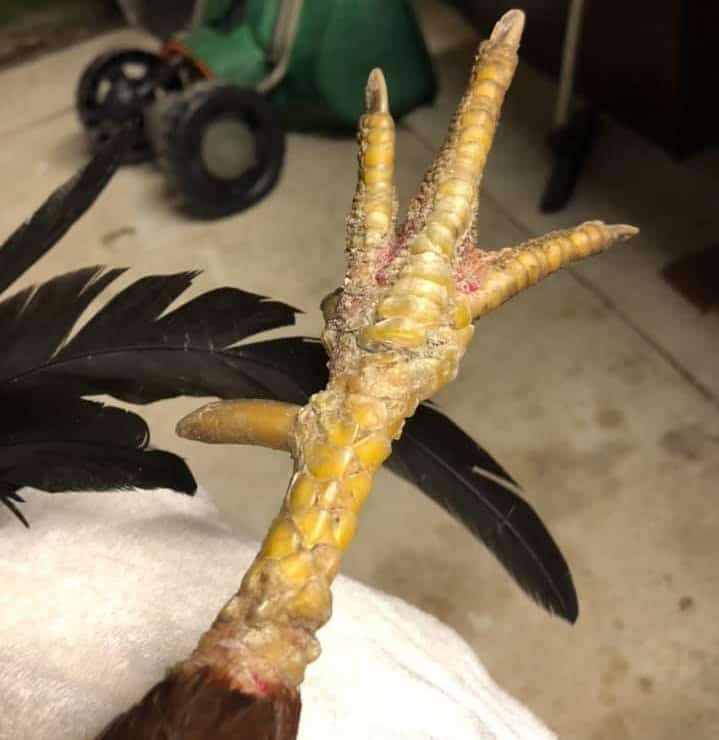
How To Control Scaly Leg Mites
- Soak the chicken’s legs in a warm Epsom salt solution. ( English Salt)
- Gently remove any loose skin and scales.
- Dry the legs and oil them thoroughly with organic coconut or olive oil. Make sure you get fat in everywhere.
- Dry off all excess oil.
- Cover with a thick layer of Vaseline so the mites can suffocate.
- Repeat three times a week until all mites are dead.
While your chickens are fighting mites, you can help them by feeding extra proteins like mealworms and spinach to replace iron due to blood loss.
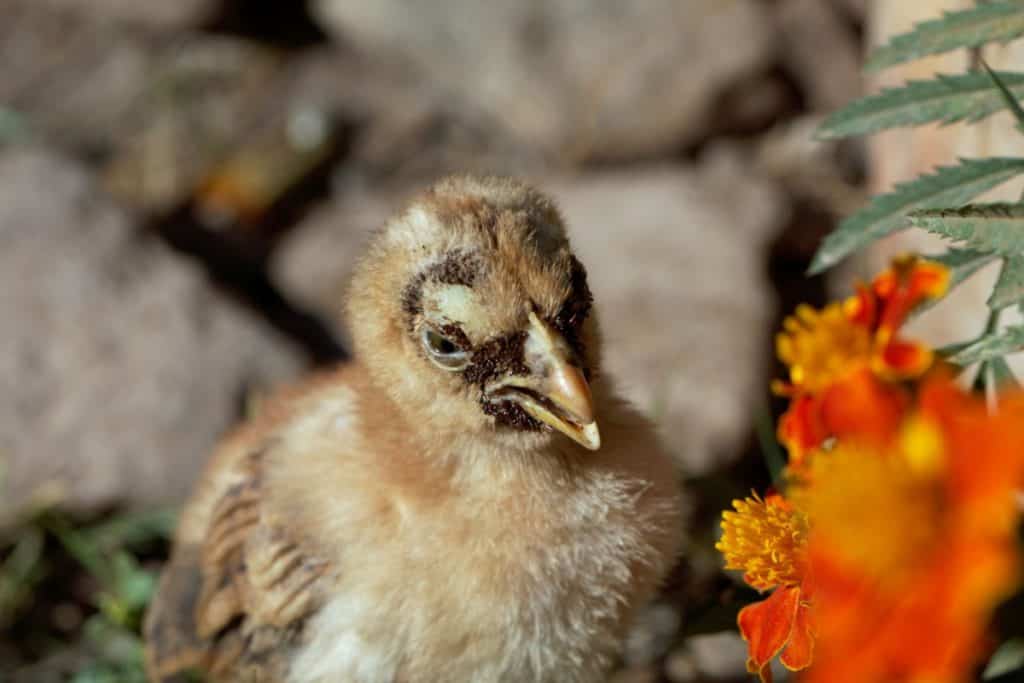
Fleas On Chickens
Fleas are more prolific and active in the warmer months. If it’s sweltering, you can prepare for a flea infestation. You will commonly deal with two types of fleas;
- The Western Chick Flea/ Black Hen Flea
- The European Chick Flea – the most common in the USA.
Since fleas are large enough to spot with the naked eye and jump, they are easy to identify. The Western chick flea lives in the poop of the chickens and not commonly on the chickens themselves.
How To Treat For Fleas
- Dust all your chickens with organic Diatomaceous Earth or approved carbaryl-containing powder.
- Clean out all nesting materials and burn them.
- Spray the entire coop with a flea killer.
- Repeat the entire regiment two weeks later to end the life cycle of the fleas.
Lice On Chickens
Lice are more common than fleas. Four types typically plague chicken in the USA;
- Shaft Louse
- Wing Louse
- Body Louse and
- Head Louse
Lice travel on birds and people, items of clothing, and even wild birds. You need to quarantine new chickens before introducing them to the coop if they might have any parasites.
How To Treat For Lice
- Dust the entire flock with organic Diatomaceous Earth or a Carbaryl containing dust.
- Clean the coop and spray with recommended lice killer.
- Repeat after 21 days to break the life cycle of lice.
Internal Parasites In Chickens
Roundworms
Three types of roundworms can affect the health of your chickens;
- Cecal Worms.
- Tiny Roundworms or Capillary or Threadworms.
- Large Roundworms or Ascarids.
All three can cause significant damage to the chicken’s eyes, digestive tract, and internal organs need to be dealt with immediately.
Signs of Roundworm Infestation
- Gasping or a constant yawning motion.
- Head shaking.
- Isolation.
- Loss of appetite
- Loss of balance
- Foamy poop
- Decrease in egg production
How To Treat For Roundworms
For small roundworms – Levamisole-containing medication.
For large and cecal roundworms – Piperazine containing medication.
Treat according to the recommended dosages in the medication insert. It is recommended that you not eat the eggs or the meat of a treated chicken for 20 days after the last dosage.
Tapeworms
Since tapeworms get transferred via a host, the easiest way of treating tapeworms in chickens is prevention where possible. Chickens that regularly eat earthworms, lizards, and snails are prone to getting tapeworm. Try to remove access to these hosts from your chickens where possible.
How To Treat For Tapeworms
Treat your chickens with medicine containing Praziquantel, Albendazole, or Fenbendazole. Read the insert and treat according to the directions.
Natural Remedy vs. Conventional Remedy
If you love your chickens as I do, chances are you are always looking for a more natural solution for every problem. I found that natural de-worming works wonders, it is highly effective, and it’s not so harsh on the chickens. Here are a few favorites you can try;
- Cucumber Seeds – The seeds inside a cucumber are a natural de-wormer. You can cut the cucumber in sections and let them a feast.
- Grated Carrots – Mix this into any vegetable treat.
- Red Onions – Chop it fine and mix with any treats.
- Garlic – Most probably one of the most potent de-worming agents in the natural field. Chop it up finely and mix with a bit of plain yogurt—around two cloves per hen per serving.
- Pumpkin Seeds – The seeds work as a natural deterrent for parasites. You can give them pumpkin every day.
- Wormwood – No medicine arsenal should be without Wormwood. You can feed them the dried leaves mixed into a treat.
How Often Should I Treat Chickens For Parasites?
If your chickens are free-range, chances are they scratch in the soil all day and eat all sorts of bugs. The best thing to do is to treat them preventatively. Give them access to natural de-worming foods at least weekly.
For external parasites, you can give your chickens access to a good wood ash dust bath. The easiest is to use a plastic children’s sandpit container. You can bury that into the ground and fill it 2/3 up. Add a bit of fine peat moss.
Conclusions
Treating chickens for parasites is one of the more critical things you need to pay attention to. The health of your chickens will affect the quality of the mat as well as the eggs. Parasites can kill chickens if left untreated, and it is a horrible death to suffer.
Some parasites can transfer to humans, so it’s a good idea to regularly de-worm yourself and your family as well every six months. A parasite-free flock is a happy flock and will give you excellent eggs, meat, and peace of mind.

